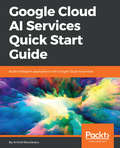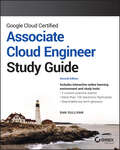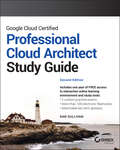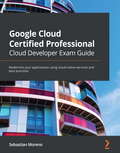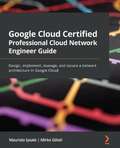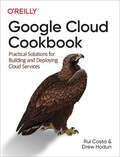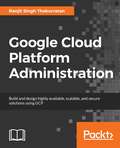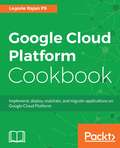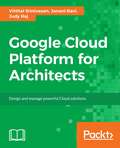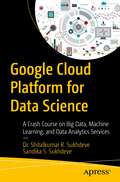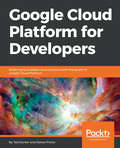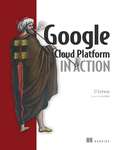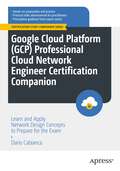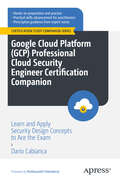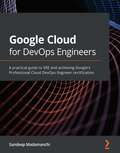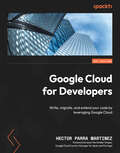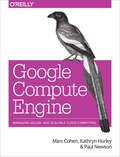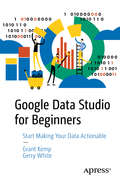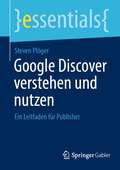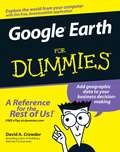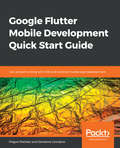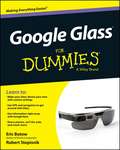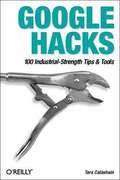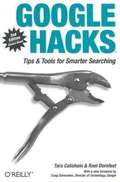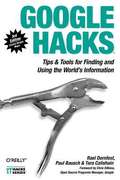- Table View
- List View
Google Cloud AI Services Quick Start Guide: Build intelligent applications with Google Cloud AI services
by Arvind RavulavaruLeverage the power of various Google Cloud AI Services by building a smart web application using MEAN StackKey FeaturesStart working with the Google Cloud Platform and the AI services it offersBuild smart web applications by combining the power of Google Cloud AI services and the MEAN stackBuild a web-based dashboard of smart applications that perform language processing, translation, and computer vision on the cloudBook DescriptionCognitive services are the new way of adding intelligence to applications and services. Now we can use Artificial Intelligence as a service that can be consumed by any application or other service, to add smartness and make the end result more practical and useful.Google Cloud AI enables you to consume Artificial Intelligence within your applications, from a REST API. Text, video and speech analysis are among the powerful machine learning features that can be used. This book is the easiest way to get started with the Google Cloud AI services suite and open up the world of smarter applications.This book will help you build a Smart Exchange, a forum application that will let you upload videos, images and perform text to speech conversions and translation services. You will use the power of Google Cloud AI Services to make our simple forum application smart by validating the images, videos, and text provided by users to Google Cloud AI Services and make sure the content which is uploaded follows the forum standards, without a human curator involvement.You will learn how to work with the Vision API, Video Intelligence API, Speech Recognition API, Cloud Language Process, and Cloud Translation API services to make your application smarter.By the end of this book, you will have a strong understanding of working with Google Cloud AI Services, and be well on the way to building smarter applications.What you will learnUnderstand Google Cloud Platform and its Cloud AI servicesExplore the Google ML ServicesWork with an Angular 5 MEAN stack applicationIntegrate Vision API, Video Intelligence API for computer visionBe ready for conversational experiences with the Speech Recognition API, Cloud Language Process and Cloud Translation API servicesBuild a smart web application that uses the power of Google Cloud AI services to make apps smarterWho this book is forThis book is ideal for data professionals and web developers who want to use the power of Google Cloud AI services in their projects, without the going through the pain of mastering machine learning for images, videos and text. Some familiarity with the Google Cloud Platform will be helpful.
Google Cloud Certified Associate Cloud Engineer Study Guide (Sybex Study Guide)
by Dan SullivanQuickly and efficiently prepare for the Google Associate Cloud Engineer certification with the proven Sybex method In the newly updated Second Edition of Google Cloud Certified Associate Cloud Engineer Study Guide, expert engineer and tech educator Dan Sullivan delivers an essential handbook for anyone preparing for the challenging Associate Cloud Engineer exam offered by Google and for those seeking to upgrade their Google Cloud engineering skillset. The book provides readers with coverage of every domain and competency tested by the Associate Cloud Engineer exam, including how to select the right Google compute service from the wide variety of choices, how to choose the best storage option for your services, and how to implement appropriate security controls and network functionality. This guide also offers: A strong emphasis on transforming readers into competent, job-ready applicants, with a focus on building skills in high demand by contemporary employers Concrete test-taking strategies, techniques, and tips to help readers conquer exam anxiety Complimentary access to a comprehensive online learning environment, complete with practice testsA must-have resource for practicing and aspiring Google Cloud engineers, Google Cloud Certified Associate Cloud Engineer Study Guide allows you to prepare for this challenging certification efficiently and completely.
Google Cloud Certified Professional Cloud Architect Study Guide (Sybex Study Guide)
by Dan SullivanAn indispensable guide to the newest version of the Google Certified Professional Cloud Architect certification The newly revised Second Edition of the Google Cloud Certified Professional Cloud Architect Study Guide delivers a proven and effective roadmap to success on the latest Professional Cloud Architect accreditation exam from Google. You'll learn the skills you need to excel on the test and in the field, with coverage of every exam objective and competency, including focus areas of the latest exam such as Kubernetes, Anthos, and multi-cloud architectures. The book explores the design, analysis, development, operations, and migration components of the job, with intuitively organized lessons that align with the real-world job responsibilities of a Google Cloud professional and with the PCA exam topics. Architects need more than the ability to recall facts about cloud services, they need to be able to reason about design decisions. This study guide is unique in how it helps you learn to think like an architect: understand requirements, assess constraints, choose appropriate architecture patterns, and consider the operational characteristics of the systems you design. Review questions and practice exams use scenario-based questions like those on the certification exam to build the test taking skills you will need. In addition to comprehensive material on compute resources, storage systems, networks, security, legal and regulatory compliance, reliability design, technical and business processes, and more, you'll get: The chance to begin or advance your career as an in-demand Google Cloud IT professional Invaluable opportunities to develop and practice the skills you'll need as a Google Cloud Architect Access to the Sybex online learning center, with chapter review questions, full-length practice exams, hundreds of electronic flashcards, and a glossary of key terms The ideal resource for anyone preparing for the Professional Cloud Architect certification from Google, Google Cloud Certified Professional Cloud Architect Study Guide, 2nd Edition is also a must-read resource for aspiring and practicing cloud professionals seeking to expand or improve their technical skillset and improve their effectiveness in the field.
Google Cloud Certified Professional Cloud Developer Exam Guide: Modernize your applications using cloud-native services and best practices
by Sebastian MorenoDiscover how Google Cloud services can help you to reduce operational tasks and focus on delivering business value with your applicationsKey FeaturesDesign, develop, and deploy end-to-end cloud-native applications using Google Cloud servicesPrepare for the GCP developer exam with the help of a fictitious business case and a Q&A sectionGet hands-on with implementing code examples of different GCP services in your applicationsBook DescriptionGoogle Cloud Platform is one of the three major cloud providers in the industry, exhibiting great leadership in application modernization and data management. This book provides a comprehensive introduction for those who are new to cloud development and shows you how to use the tools to create cloud-native applications by integrating the technologies used by Google. The book starts by taking you through the basic programming concepts and security fundamentals necessary for developing in Google Cloud. You'll then discover best practices for developing and deploying applications in the cloud using different components offered by Google Cloud Platform such as Cloud Functions, Google App Engine, Cloud Run, and other GCP technologies. As you advance, you'll learn the basics of cloud storage and choosing the best options for storing different kinds of data as well as understand what site reliability engineers do. In the last part, you'll work on a sample case study of Hip Local, a community application designed to facilitate communication between people nearby, created by the Google Cloud team. By the end of this guide, you'll have learned how to design, develop, and deploy an end-to-end application on the Google Cloud Platform.What you will learnGet to grips with the fundamentals of Google Cloud Platform developmentDiscover security best practices for applications in the cloudFind ways to create and modernize legacy applicationsUnderstand how to manage data and databases in Google CloudExplore best practices for site reliability engineering, monitoring, logging, and debuggingBecome well-versed with the practical implementation of GCP with the help of a case studyWho this book is forThis book is for cloud engineers or developers working or starting to work on Google Cloud Platform and looking to take advantage of cloud-native applications. You'll also find this book useful if you are preparing for the GCP developer exam.
Google Cloud Certified Professional Cloud Network Engineer Guide: Design, implement, manage, and secure a network architecture in Google Cloud
by Maurizio Ipsale Mirko GilioliGain practical skills to design, deploy, and manage networks on Google Cloud and prepare to gain Professional Cloud Network Engineer certificationKey FeaturesGain hands-on experience in implementing VPCs, hybrid connectivity, network services, and securityEstablish a secure network architecture by learning security best practicesLeverage this comprehensive guide to gain Professional Cloud Network Engineer certificationBook DescriptionGoogle Cloud, the public cloud platform from Google, has a variety of networking options, which are instrumental in managing a networking architecture. This book will give you hands-on experience of implementing and securing networks in Google Cloud Platform (GCP).You will understand the basics of Google Cloud infrastructure and learn to design, plan, and prototype a network on GCP. After implementing a Virtual Private Cloud (VPC), you will configure network services and implement hybrid connectivity. Later, the book focuses on security, which forms an important aspect of a network. You will also get to grips with network security and learn to manage and monitor network operations in GCP. Finally, you will learn to optimize network resources and delve into advanced networking. The book also helps you to reinforce your knowledge with the help of mock tests featuring exam-like questions.By the end of this book, you will have gained a complete understanding of networking in Google Cloud and learned everything you need to pass the certification exam.What you will learnUnderstand the fundamentals of Google Cloud architectureImplement and manage network architectures in Google Cloud PlatformGet up to speed with VPCs and configure VPC networks, subnets, and routersUnderstand the command line interface and GCP console for networkingGet to grips with logging and monitoring to troubleshoot network and securityUse the knowledge you gain to implement advanced networks on GCPWho this book is forThis Google Cloud certification book is for cloud network engineers, cloud architects, cloud engineers, administrators, and anyone who is looking to design, implement, and manage network architectures in Google Cloud Platform. You can use this book as a guide for passing the Professional Cloud Network Engineer certification exam. You need to have at least a year of experience in Google Cloud, basic enterprise-level network design experience, and a fundamental understanding of Cloud Shell to get started with this book.
Google Cloud Cookbook: Practical Solutions for Building and Deploying Cloud Services
by Drew Hodun Rui Santos CostaGet quick hands-on experience with Google Cloud. This cookbook provides a variety of self-contained recipes that show you how to use Google Cloud services for your enterprise application. Whether you're looking for practical ways to apply microservices, AI, analytics, security, or networking solutions, these recipes take you step-by-step through the process and provide discussions that explain how and why the recipes work.Ideal for system engineers and administrators, developers, network and database administrators, and data analysts, this cookbook helps you get started with Google Cloud regardless of your level of experience. Google veterans Rui Costa and Drew Hodun also cover advanced-level Google Cloud services for those who have appreciable experience with the platform.Learn how to get started with Google CloudUnderstand the depth of services Google Cloud providesGain hands-on experience using practical examples and labsExplore topics that include BigQuery, Cloud Run, and KubernetesBuild and run mobile and web applications on Google CloudExamine ways to build your cloud applications for scaleBuild a minimum viable product (MVP) app to use in productionLearn data platform and pipeline skills
Google Cloud Platform Administration: Design highly available, scalable, and secure cloud solutions on GCP
by Ranjit Singh ThakurratanMake the most of GCP’s offerings to manage your data center workload and optimize deploymentsKey FeaturesDiscover new techniques to administer, manage, and deploy applications on GCPUnderstand effective solutions for storing, retrieving, and deploying your container imagesExplore various offerings of GCP for operations and security Book DescriptionOn-premise data centers are costly to manage. If you need a data center but don’t want to deal with a physical one, Google Cloud Platform (GCP) is the solution. With GCP, you can build, test, and deploy applications on Google’s infrastructure. Google Cloud Platform Administration begins with GCP fundamentals, with the help of which you will deploy your first app and gain an understanding of Google Cloud architecture and services. Furthermore, you will learn how to manage Compute, networking, and storage resources. As you make your way through the book, you will learn how to track and manage GCP’s usage, monitoring, and billing access control. You will also be able to manage your GCP's access and permissions. In the concluding chapters, you will explore a list of different developer tools for managing and interacting with the GCP platform. By the end of this book, you will have learned how to effectively deploy workloads on GCP.What you will learnUnderstand all GCP Compute componentsDeploy and manage multiple GCP storage optionsManage and utilize the networking resources offered by GCPExplore the functionalities and features of the GCP Container Understand the workings of GCP operations such as monitoring and error reporting Discover an immune GCP using its identity and security optionsWho this book is forGoogle Cloud Platform Administration is for administrators, cloud architects, and engineers who want to leverage the upcoming Google Cloud Platform. Some basic understanding of cloud computing will be useful.
Google Cloud Platform Cookbook: Implement, deploy, maintain, and migrate applications on Google Cloud Platform
by Legorie Rajan PsPractical recipes to implement cost-effective and scalable cloud solutions for your organizationKey FeaturesImplement Google Cloud services in your organizationLeverage Google Cloud components to secure your organization’s dataA recipe-based guide that promises hands-on experience in deploying a highly scalable and available environmentBook DescriptionGoogle Cloud Platform is a cloud computing platform that offers products and services to host applications using state-of-the art infrastructure and technology. You can build and host applications and websites, store data, and analyze data on Google's scalable infrastructure. This book follows a recipe-based approach, giving you hands-on experience to make the most of Google Cloud services.This book starts with practical recipes that explain how to utilize Google Cloud's common services. Then, you'll see how to make full use of Google Cloud components such as networking, security, management, and developer tools. Next, we'll deep dive into implementing core Google Cloud services into your organization, with practical recipes on App Engine, Compute Engine microservices with Cloud Functions, virtual networks, and Cloud Storage. Later, we'll provide recipes on implementing authentication and security, Cloud APIs, command-line management, deployment management, and the Cloud SDK. Finally, we'll cover administration troubleshooting tasks with the Compute and Container Engines and we'll show how to monitor your organization's efficiency with best practices.By the end of this book, you'll have a complete understanding of how to implement Google Cloud services in your organization with ease.What you will learn Host a Python application on Google Compute Engine Host an application using Google Cloud Functions Migrate a MySQL DB to Cloud Spanner Configure a network for a highly available application on GCP Learn simple image processing using Storage and Cloud Functions Automate security checks using Policy Scanner Understand tools for monitoring a production environment in GCP Learn to manage multiple projects using service accountsWho this book is forThis book is for IT professionals, engineers, and developers looking at implementing Google Cloud in their organizations. Administrators and architects planning to make their organization more efficient with Google Cloud will also find this book useful. Basic understanding of Cloud services and the Google Cloud platform is necessary.
Google Cloud Platform for Architects: Design and manage powerful cloud solutions
by Janani Ravi Judy Raj Vitthal SrinivasanGet acquainted with GCP and manage robust, highly available, and dynamic solutions to drive business objectiveKey Features●Identify the strengths, weaknesses and ideal use-cases for individual services offered on the Google Cloud Platform●Make intelligent choices about which cloud technology works best for your use-case●Leverage Google Cloud Platform to analyze and optimize technical and business processesBook DescriptionUsing a public cloud platform was considered risky a decade ago, and unconventional even just a few years ago. Today, however, use of the public cloud is completely mainstream - the norm, rather than the exception. Several leading technology firms, including Google, have built sophisticated cloud platforms, and are locked in a fierce competition for market share.The main goal of this book is to enable you to get the best out of the GCP, and to use it with confidence and competence. You will learn why cloud architectures take the forms that they do, and this will help you become a skilled high-level cloud architect. You will also learn how individual cloud services are configured and used, so that you are never intimidated at having to build it yourself. You will also learn the right way and the right situation in which to use the important GCP services.By the end of this book, you will be able to make the most out of Google Cloud Platform design.What you will learn●Set up GCP account and utilize GCP services using the cloud shell, web console, and client APIs●Harness the power of App Engine, Compute Engine, Containers on the Kubernetes Engine, and Cloud Functions●Pick the right managed service for your data needs, choosing intelligently between Datastore, BigTable, and BigQuery●Migrate existing Hadoop, Spark, and Pig workloads with minimal disruption to your existing data infrastructure, by using Dataproc intelligently●Derive insights about the health, performance, and availability of cloud-powered applications with the help of monitoring, logging, and diagnostic tools in StackdriverWho this book is forIf you are a Cloud architect who is responsible to design and manage robust cloud solutions with Google Cloud Platform, then this book is for you. System engineers and Enterprise architects will also find this book useful. A basic understanding of distributed applications would be helpful, although not strictly necessary. Some working experience on other public cloud platforms would help too.
Google Cloud Platform for Data Science: A Crash Course on Big Data, Machine Learning, and Data Analytics Services
by Dr. Shitalkumar Sukhdeve Sandika S. SukhdeveThis book is your practical and comprehensive guide to learning Google Cloud Platform (GCP) for data science, using only the free tier services offered by the platform.Data science and machine learning are increasingly becoming critical to businesses of all sizes, and the cloud provides a powerful platform for these applications. GCP offers a range of data science services that can be used to store, process, and analyze large datasets, and train and deploy machine learning models.The book is organized into seven chapters covering various topics such as GCP account setup, Google Colaboratory, Big Data and Machine Learning, Data Visualization and Business Intelligence, Data Processing and Transformation, Data Analytics and Storage, and Advanced Topics. Each chapter provides step-by-step instructions and examples illustrating how to use GCP services for data science and big data projects.Readers will learn how to set up a Google Colaboratory account and run Jupyter notebooks, access GCP services and data from Colaboratory, use BigQuery for data analytics, and deploy machine learning models using Vertex AI. The book also covers how to visualize data using Looker Data Studio, run data processing pipelines using Google Cloud Dataflow and Dataprep, and store data using Google Cloud Storage and SQL.What You Will LearnSet up a GCP account and projectExplore BigQuery and its use cases, including machine learningUnderstand Google Cloud AI Platform and its capabilities Use Vertex AI for training and deploying machine learning modelsExplore Google Cloud Dataproc and its use cases for big data processingCreate and share data visualizations and reports with Looker Data StudioExplore Google Cloud Dataflow and its use cases for batch and stream data processing Run data processing pipelines on Cloud DataflowExplore Google Cloud Storage and its use cases for data storage Get an introduction to Google Cloud SQL and its use cases for relational databases Get an introduction to Google Cloud Pub/Sub and its use cases for real-time data streamingWho This Book Is ForData scientists, machine learning engineers, and analysts who want to learn how to use Google Cloud Platform (GCP) for their data science and big data projects
Google Cloud Platform for Developers: Build highly scalable cloud solutions with the power of Google Cloud Platform
by Steven Porter Ted HunterDevelop, deploy, and scale your applications with Google Cloud PlatformKey FeaturesCreate and deploy your applications on Google Cloud Platform Store and manage source code and debug Cloud-hosted apps with plugins and IDEsStreamline developer workflows with tools for alerting and managing deploymentsBook DescriptionGoogle Cloud Platform (GCP) provides autoscaling compute power and distributed in-memory cache, task queues, and datastores to write, build, and deploy Cloud-hosted applications.With Google Cloud Platform for Developers, you will be able to develop and deploy scalable applications from scratch and make them globally available in almost any language. This book will guide you in designing, deploying, and managing applications running on Google Cloud. You’ll start with App Engine and move on to work with Container Engine, compute engine, and cloud functions. You’ll learn how to integrate your new applications with the various data solutions on GCP, including Cloud SQL, Bigtable, and Cloud Storage. This book will teach you how to streamline your workflow with tools such as Source Repositories, Container Builder, and StackDriver. Along the way, you’ll see how to deploy and debug services with IntelliJ, implement continuous delivery pipelines, and configure robust monitoring and alerting for your production systems.By the end of this book, you’ll be well-versed with all the development tools of Google Cloud Platform, and you’ll develop, deploy, and manage highly scalable and reliable applications.What you will learnUnderstand the various service offerings on GCPDeploy and run services on managed platforms such as App Engine and Container EngineSecurely maintain application states with Cloud Storage, Datastore, and BigtableLeverage StackDriver monitoring and debugging to minimize downtime and mitigate issues without impacting usersDesign and implement complex software solutions utilizing Google CloudIntegrate with best-in-class big data solutions such as Bigquery, Dataflow, and Pub/SubWho this book is forGoogle Cloud Platform for Developers is for application developers. This book will enable you to fully leverage the power of Google Cloud Platform to build resilient and intelligent software solutions.
Google Cloud Platform in Action
by John J. GeewaxSummaryGoogle Cloud Platform in Action teaches you to build and launch applications that scale, leveraging the many services on GCP to move faster than ever. You'll learn how to choose exactly the services that best suit your needs, and you'll be able to build applications that run on Google Cloud Platform and start more quickly, suffer fewer disasters, and require less maintenance.Purchase of the print book includes a free eBook in PDF, Kindle, and ePub formats from Manning Publications.About the TechnologyThousands of developers worldwide trust Google Cloud Platform, and for good reason. With GCP, you can host your applications on the same infrastructure that powers Search, Maps, and the other Google tools you use daily. You get rock-solid reliability, an incredible array of prebuilt services, and a cost-effective, pay-only-for-what-you-use model. This book gets you started.About the BookGoogle Cloud Platform in Action teaches you how to deploy scalable cloud applications on GCP. Author and Google software engineer JJ Geewax is your guide as you try everything from hosting a simple WordPress web app to commanding cloud-based AI services for computer vision and natural language processing. Along the way, you'll discover how to maximize cloud-based data storage, roll out serverless applications with Cloud Functions, and manage containers with Kubernetes. Broad, deep, and complete, this authoritative book has everything you need.What's insideThe many varieties of cloud storage and computingHow to make cost-effective choicesHands-on code examplesCloud-based machine learningAbout the ReaderWritten for intermediate developers. No prior cloud or GCP experience required.About the AuthorJJ Geewax is a software engineer at Google, focusing on Google Cloud Platform and API design.Table of ContentsPART 1 - GETTING STARTED What is "cloud"? Trying it out: deploying WordPress on Google Cloud The cloud data center PART 2 - STORAGE Cloud SQL: managed relational storage Cloud Datastore: document storage Cloud Spanner: large-scale SQL Cloud Bigtable: large-scale structured data Cloud Storage: object storage PART 3 - COMPUTINGCompute Engine: virtual machines Kubernetes Engine: managed Kubernetes clusters App Engine: fully managed applications Cloud Functions: serverless applications Cloud DNS: managed DNS hosting PART 4 - MACHINE LEARNINGCloud Vision: image recognition Cloud Natural Language: text analysis Cloud Speech: audio-to-text conversion Cloud Translation: multilanguage machine translation Cloud Machine Learning Engine: managed machine learning PART 5 - DATA PROCESSING AND ANALYTICSBigQuery: highly scalable data warehouse Cloud Dataflow: large-scale data processing Cloud Pub/Sub: managed event publishing
Google Cloud Platform: Learn and Apply Network Design Concepts to Prepare for the Exam (Certification Study Companion Series)
by Dario CabiancaWhile many guides exist to help software engineers learn cloud networking design and architecture concepts, and even prepare for cloud network certifications on AWS and Azure, far fewer resources are available covering the Google Cloud Platform (GCP) Professional Cloud Network Engineer certification exam. Well, look no further! This self-paced guide book is designed to help engineers learn cloud networking best practices on GCP, and prepare for the GCP Professional Cloud Network Engineer certification exam. You will waste no time when you use this study companion. It lets you dive in and learn how GCP differs from other public cloud providers (AWS and Microsoft Azure). You will understand GCP's unique ability to allow virtual private clouds (VPCs) that span across multiple regions. You will know how to leverage GCP as a competitive advantage in the IT engineering community. Key concepts covered on the exam are called out and applied in each chapter of this book, giving you both practice and reinforcement, a far more effective learning tool than rote learning or similar approaches typically enlisted in exam preparation. Enterprises are looking for developers with Google networking skills. Now is the time to skill up! This book shows you how to leverage GCP’s developer-focused, user-friendly approach to understand how the networking components enabling the popular 1B-user Google products (e.g., Gmail, Google Search, YouTube, Google Workspace (formerly G-Suite), Google Maps, Google Photos, and many others) work behind the scenes.What You Will Learn In addition to preparing for the GCP Professional Cloud Network Engineer certification exam, you will learn how to:Architect and design a virtual private cloudImplement a virtual private cloudConfigure network servicesImplement hybrid connectivityImplement network securityManage network operationsOptimize network resources Who This Book Is ForSoftware engineers (network, DevOps, SecOps, DataOps, engineers skilled with SDLC), software architects (solution, security, data, infrastructure, cloud, those skilled with TOGAF), and IT professionals. Prerequisites: While this study companion is intended to be self-contained, a basic knowledge of cloud computing along with hands-on experience with a minimum of two modern programming languages (Java, C#) is beneficial in order for readers to fully achieve the objectives of the book.
Google Cloud Platform: Learn and Apply Security Design Concepts to Ace the Exam (Certification Study Companion Series)
by Dario CabiancaWritten in a simple and developer-focused style, this book gives you the tools and knowledge you need to ace the GCP Professional Cloud Security Engineer certification exam. The approach is two-fold: introducing and implementing all GCP cloud security concepts and controls based on the certification exam objectives, and demonstrating how these concepts can be applied to real-world scenarios. Your study begins with cloud identities in GCP and different identity types (user accounts, service accounts, groups, and domains) and how separation of duties is implemented with access controls and Identity and Access Management (IAM). Emphasis is placed on the unique GCP approach to managing resources, with its clear distinction between resource ownership and resource billing. Following the defense in depth principle, the book shifts focus to network security and introduces different types of constructs that enable micro-segmentation, as they are implemented in a software-defined network. A chapter devoted to data protection is included. You will learn how to leverage the Data Loss Prevention (DLP) application programming interface (API) to prevent access to your workloads’ sensitive data from unauthorized use. Examples on how to use the DLP API are provided using the Go language, which is becoming widely adopted in the developer community due to its simplicity, and high-performance networking and multi-processing capabilities. Encryption at rest, in use, and in transit is covered with an overview on how GCP implements confidential computing. The book concludes with an examination of the GCP services you need to know to monitor, audit, and ensure compliance with the laws and regulations where your workloads and infrastructure operate. By the end of the book, you will have acquired the knowledge and confidence to pass the GCP Professional Cloud Security Engineer certification exam and to successfully design, architect, and engineer security solutions with the Google Cloud Platform. Bonus Material: IAM deny policies What You Will Learn Understand the five security principles and how to use them to drive the development of modern security architectures in Google Cloud Secure identities with Cloud Identity and Identity & Access Management (IAM) Secure the network with segmentation and private connectivity Protect sensitive data with the Data Loss Prevention (DLP) API and encryption Monitor, log, audit, and troubleshoot security incidents with the Google Cloud Operations Suite Ensure compliance and address regulatory concerns Who This Book Is For Software engineers specializing in DevOps, SecOps, and DataOps, who possess expertise in the Software Development Life Cycle (SDLC) methodologies within Agile teams. It also targets software architects with proficiency in various domains such as security, network, solution, data, infrastructure, cloud, and enterprise architecture.
Google Cloud for DevOps Engineers: A practical guide to SRE and achieving Google's Professional Cloud DevOps Engineer certification
by Sandeep MadamanchiExplore site reliability engineering practices and learn key Google Cloud Platform (GCP) services such as CSR, Cloud Build, Container Registry, GKE, and Cloud Operations to implement DevOpsKey FeaturesLearn GCP services for version control, building code, creating artifacts, and deploying secured containerized applicationsExplore Cloud Operations features such as Metrics Explorer, Logs Explorer, and debug logpointsPrepare for the certification exam using practice questions and mock testsBook DescriptionDevOps is a set of practices that help remove barriers between developers and system administrators, and is implemented by Google through site reliability engineering (SRE). With the help of this book, you'll explore the evolution of DevOps and SRE, before delving into SRE technical practices such as SLA, SLO, SLI, and error budgets that are critical to building reliable software faster and balance new feature deployment with system reliability. You'll then explore SRE cultural practices such as incident management and being on-call, and learn the building blocks to form SRE teams. The second part of the book focuses on Google Cloud services to implement DevOps via continuous integration and continuous delivery (CI/CD). You'll learn how to add source code via Cloud Source Repositories, build code to create deployment artifacts via Cloud Build, and push it to Container Registry. Moving on, you'll understand the need for container orchestration via Kubernetes, comprehend Kubernetes essentials, apply via Google Kubernetes Engine (GKE), and secure the GKE cluster. Finally, you'll explore Cloud Operations to monitor, alert, debug, trace, and profile deployed applications. By the end of this SRE book, you'll be well-versed with the key concepts necessary for gaining Professional Cloud DevOps Engineer certification with the help of mock tests.What you will learnCategorize user journeys and explore different ways to measure SLIsExplore the four golden signals for monitoring a user-facing systemUnderstand psychological safety along with other SRE cultural practicesCreate containers with build triggers and manual invocationsDelve into Kubernetes workloads and potential deployment strategiesSecure GKE clusters via private clusters, Binary Authorization, and shielded GKE nodesGet to grips with monitoring, Metrics Explorer, uptime checks, and alertingDiscover how logs are ingested via the Cloud Logging APIWho this book is forThis book is for cloud system administrators and network engineers interested in resolving cloud-based operational issues. IT professionals looking to enhance their careers in administering Google Cloud services and users who want to learn about applying SRE principles and implementing DevOps in GCP will also benefit from this book. Basic knowledge of cloud computing, GCP services, and CI/CD and hands-on experience with Unix/Linux infrastructure is recommended. You'll also find this book useful if you're interested in achieving Professional Cloud DevOps Engineer certification.
Google Cloud for Developers: Write, migrate, and extend your code by leveraging Google Cloud
by Hector Parra Martinez Isaac Hernandez VargasUnlock your potential with this ultimate guide to Google Cloud – packed with expert tips, coding techniques, legacy migration, and application extension strategiesPurchase of the print or Kindle book includes a free PDF eBookKey FeaturesMaximize your code potential using Google Cloud servicesMigrate legacy code to the cloud seamlessly and create code that runs anywhereUse hands-on examples to learn and showcase your experience with Google CloudBook DescriptionAs more organizations embrace cloud computing, developers new to the cloud often feel overwhelmed by cloud migration and code running directly on the cloud. Google Cloud for Developers comes packed with practical tips and expert advice to accelerate your application development journey and help you unlock the full potential of cloud computing. You'll begin by understanding and comparing all the available options to run your code. You'll write, deploy, monitor, and troubleshoot your code without leaving the Google Cloud IDE while selecting the best option – serverless or GKE containers – for each use case. After that, you'll get to grips with the basic Google Cloud infrastructure services and connect your code with public APIs. This will help you add features to your application, such as language translation and object detection in images or videos. Furthermore, you'll explore a comprehensive list of tips and best practices to make your migration smooth. You'll also gain the necessary knowledge to write code from scratch, by employing the basics of hybrid cloud applications and build services that can run virtually anywhere. By the end of this book, you'll be well equipped to carry out the application development process and successfully move your code to Google Cloud.What you will learnUnderstand how to write, run, and troubleshoot code on Google CloudChoose between serverless or GKE containers for running your codeConnect your code to Google Cloud services using public APIsMigrate your code to Google Cloud flawlesslyBuild hybrid cloud solutions that can run virtually anywhereGet to grips with Cloud Functions, App Engine, GKE, and AnthosWho this book is forGoogle Cloud for Developers is for cloud architects, engineers, or developers willing to migrate their applications and services to Google Cloud or build them from scratch. Entrepreneurs in early-stage start-ups and IT professionals who want to know more about Google Cloud from a developer perspective will also benefit from this book. A basic understanding of Cloud concepts and basic experience in writing Python and Shell scripts is a must.
Google Compute Engine: Managing Secure and Scalable Cloud Computing
by Marc Cohen Kathryn Hurley Paul NewsonLearn how to run large-scale, data-intensive workloads with Compute Engine, Google’s cloud platform. Written by Google engineers, this tutorial walks you through the details of this Infrastructure as a Service by showing you how to develop a project with it from beginning to end. You’ll learn best practices for using Compute Engine, with a focus on solving practical problems.With programming examples written in Python and JavaScript, you’ll also learn how to use Compute Engine with Docker containers and other platforms, frameworks, tools, and services. Discover how this IaaS helps you gain unparalleled performance and scalability with Google’s advanced storage and computing technologies.Access and manage Compute Engine resources with a web UI, command-line interface, or RESTful interfaceConfigure, customize, and work with Linux VM instancesExplore storage options: persistent disk, Cloud Storage, Cloud SQL (MySQL in the cloud), or Cloud Datastore NoSQL serviceUse multiple private networks, and multiple instances on each networkBuild, deploy, and test a simple but comprehensive cloud computing application step-by-stepUse Compute Engine with Docker, Node.js, ZeroMQ, Web Starter Kit, AngularJS, WebSocket, and D3.js
Google Data Studio for Beginners: Start Making Your Data Actionable
by Gerry White Grant KempGoogle Data Studio is becoming a go-to tool in the analytics community. All business roles across the industry benefit from foundational knowledge of this now-essential technology, and Google Data Studio for Beginners is here to provide it. Release your locked-up data and turn it into beautiful, actionable, and shareable reports that can be consumed by experts and novices alike.Authors Grant Kemp and Gerry White begin by walking you through the basics, such how to create simple dashboards and interactive visualizations. As you progress through Google Data Studio for Beginners, you will build up the knowledge necessary to blend multiple data sources and create comprehensive marketing dashboards. Some intermediate features such as calculated fields, cleaning up data, and data blending to build powerhouse reports are featured as well. Presenting your data in client-ready, digestible forms is a key factor that many find to be a roadblock, and this book will help strengthen this essential skill in your organization. Centralizing the power from sources such as Google Analytics, online surveys, and a multitude of other popular data management tools puts you as a business leader and analyzer ahead of the rest. Your team as a whole will benefit from Google Data Studio for Beginners, because by using these tools, teams can collaboratively work on data to build their understanding and turn their data into action. Data Studio is quickly solidifying itself as the industry standard, and you don’t want to miss this essential guide for excelling in it. What You Will Learn Combine various data sources to create great looking and actionable visualizationsReuse and modify other dashboards that have been created by industry prosUse intermediate features such as calculated fields and data blending to build powerhouse reports Who This Book Is For Users looking to learn Google Analytics, SEO professionals, digital marketers, and other business professionals who want to mine their data into an actionable dashboard.
Google Discover verstehen und nutzen: Ein Leitfaden für Publisher (essentials)
by Steven PlögerDieses essential liefert aktuelle Erkenntnisse zu Google Discover für Publisher und Professionals, die ihre Reichweite gezielt steigern möchten. Auf unzähligen Android-Smartphones ist der Newsfeed bereits vorinstalliert und bietet damit immenses Potenzial für alle, die ihren Content effektiv optimieren. Zahlreiche Geschäftsmodelle haben sich bereits rund um Discover entwickelt, dennoch bleibt die Funktionsweise der KI-gesteuerten Plattform oft undurchsichtig. Genau hier setzt dieses Buch an: Wie lässt sich das volle Potenzial von Google Discover nutzen und die eigene Webseite, Texte und Bilder optimieren, um mehr Leser zu erreichen? Steven Plöger, erfahrener Tech-Journalist und Experte für digitale Reichweite, fasst das aktuelle Wissen und die gängigen Thesen über Google Discover zusammen – und liefert ein unverzichtbares Handbuch auf dem Weg zu mehr Sichtbarkeit im digitalen Raum.Praxiswissen aus Interviews mit über 20 Experten aus der Branche.
Google Earth For Dummies
by David A. CrowderThis interesting guide covers all aspects of Google Earth, the freely downloadable application from Google that allows users to view satellite images from all points of the globeAimed at a diverse audience, including casual users who enjoy air shots of locales as well as geographers, real estate professionals, and GPS developersIncludes valuable tips on various customizations that users can add, advice on setting up scavenger hunts, and guidance on using Google Earth to benefit a businessExplains modifying general options, managing the layer and placemark systems, and tackling some of the more technical aspects, such as interfacing with GPSThere are more than 400,000 registered users of Google Earth and the number is still growing
Google Flutter Mobile Development Quick Start Guide: Get up and running with iOS and Android mobile app development
by Prajyot Mainkar Salvatore GiordanoA fast-paced guide to get you started with cross-platform mobile application development with Google Flutter Key Features Understand the fundamentals of Flutter and get started with cross-platform mobile app development. Learn about different widgets in Flutter and understand the concepts of Routing and Navigating. Work with Platform specific code to use Native features and deploy your application on iOS and Android. Book Description Flutter is a cross-platform mobile application development framework. It uses the Dart programming language, which was created by Google, and aims to make development easier, faster, and more efficient. This book is going to be your guide, from introducing Flutter to successfully developing a cross platform application. In the first few chapters, we will learn what Flutter is and how to get started with it. We will also take a dive into the widgets world, explore the widget catalog, and learn how to navigate through it. In the next few chapters, we will widen our horizon by learning about networking and accessibility with Flutter. We'll learn what Silvers are and how to use them, and we'll also learn how to use constraints and animations. Before we take a look at how to deploy our applications in Flutter, we will use Firebase for cloud messaging and remote configuration. By the end of the book, you will have learned everything you need to know to get started with your journey of cross-platform mobile development with Flutter. What you will learn Take a tour through the widget catalog Route and navigate through the widgets Use listview and scroll widgets Gain knowledge on networking with Flutter and Dart Build and publish plugins to pub.dart.com Use Firebase cloud messaging and remote configuration Build and release your application on Android and iOS Who this book is for This book is for developers who are willing to learn flutter and develop cross-platform applications
Google Glass For Dummies
by Eric Butow Robert StepisnikA full-color guide to everything you need to know about Google Glass!With this easy-to-use guide, you can wear your Google Glass with confidence! From setup and configuration, to learning how to tap into the amazing features of Google Glass, this book has it all. Soon you'll be taking photos and video, accessing the display, using the applications, and operating the arm's touchpad. This must-have guide is filled with the important information you need. Keep the book on hand and refer to it often as you explore the world through your Google Glass.Google Glass For Dummies is the only guide you'll need to control this extraordinary technology that includes a camera, display, touchpad, battery, and microphone all built into the frames of the glasses. Not only do they allow you to access the display in your field of vision--so you can access the time, date, and weather--they also give you the ability to film videos, take and share photos, search the web, and translate languages--all on the go!Discover how to use the Google Glass tools, including the camera, display, touchpad, battery, and microphoneTap into the power of Google Glass voice controls and the bone-induction technology that vibrates to create soundFind out how to take pictures and video while you're on the goVideo conference with your coworkers using Google GlassThis handy reference is your guide to everything Google Glass, covering all of the details of this extraordinary Google gadget.
Google Hacks
by Rael Dornfest Tara CalishainGoogle Hacks is a collection of industrial-strength, real-world, tested solutions to practical problems. This concise book offers a variety of interesting ways for power users to mine the enormous amount of information that Google has access to, and helps you have fun while doing it. You'll learn clever and powerful methods for using the advanced search interface and the new Google API, including how to build and modify scripts that can become custom business applications based on Google. Google Hacks conta
Google Hacks (2nd Edition)
by Rael Dornfest Tara CalishainFeaturing dozens of refreshed hacks, plus 25 completely new ones, Google Hacks , Second Edition is an updated collection of real-world solutions to practical Google research problems. Thanks to these industrial-strength tips, now you can easily save hours of research time mining Google. Best of all, each of its 100 hacks are easy to read and digest--no confusing terminology or extraneous information to hamper your understanding. <P><P>[This text is listed as an example that meets Common Core Standards in English language arts in grades 11-12 at http://www.corestandards.org.]
Google Hacks, 3rd Edition
by Rael Dornfest Paul Bausch Tara CalishainEveryone knows that Google lets you search billions of web pages. But few people realize that Google also gives you hundreds of cool ways to organize and play with information. Since we released the last edition of this bestselling book, Google has added many new features and services to its expanding universe: Google Earth, Google Talk, Google Maps, Google Blog Search, Video Search, Music Search, Google Base, Google Reader, and Google Desktop among them. We've found ways to get these new services to do even more. The expanded third edition of Google Hacks is a brand-new and infinitely more useful book for this powerful search engine. You'll not only find dozens of hacks for the new Google services, but plenty of updated tips, tricks and scripts for hacking the old ones. Now you can make a Google Earth movie, visualize your web site traffic with Google Analytics, post pictures to your blog with Picasa, or access Gmail in your favorite email client. Industrial strength and real-world tested, this new collection enables you to mine a ton of information within Google's reach. And have a lot of fun while doing it: Search Google over IM with a Google Talk bot Build a customized Google Map and add it to your own web site Cover your searching tracks and take back your browsing privacy Turn any Google query into an RSS feed that you can monitor in Google Reader or the newsreader of your choice Keep tabs on blogs in new, useful ways Turn Gmail into an external hard drive for Windows, Mac, or Linux Beef up your web pages with search, ads, news feeds, and more Program Google with the Google API and language of your choice For those of you concerned about Google as an emerging Big Brother, this new edition also offers advice and concrete tips for protecting your privacy. Get into the world of Google and bend it to your will!
